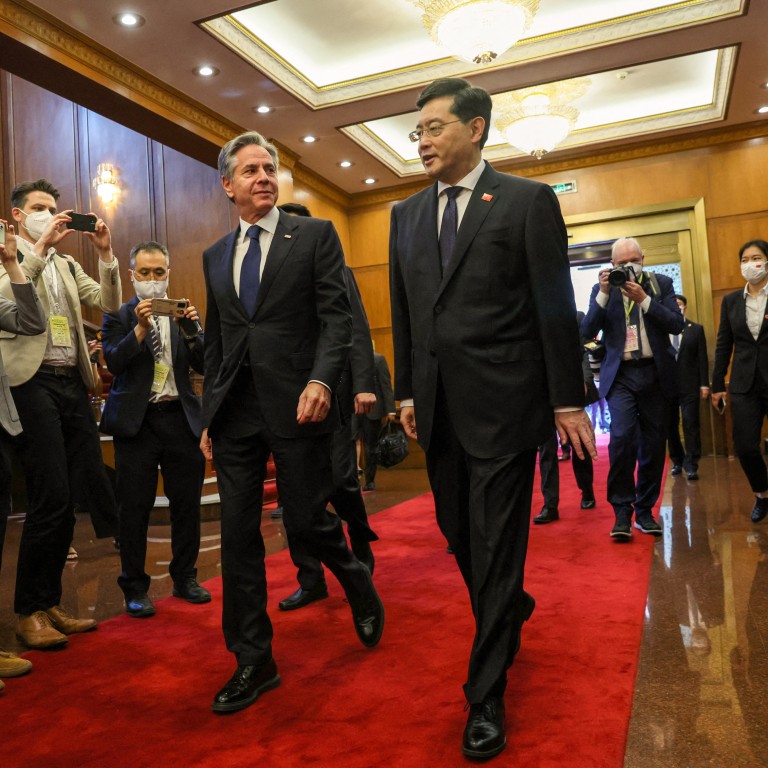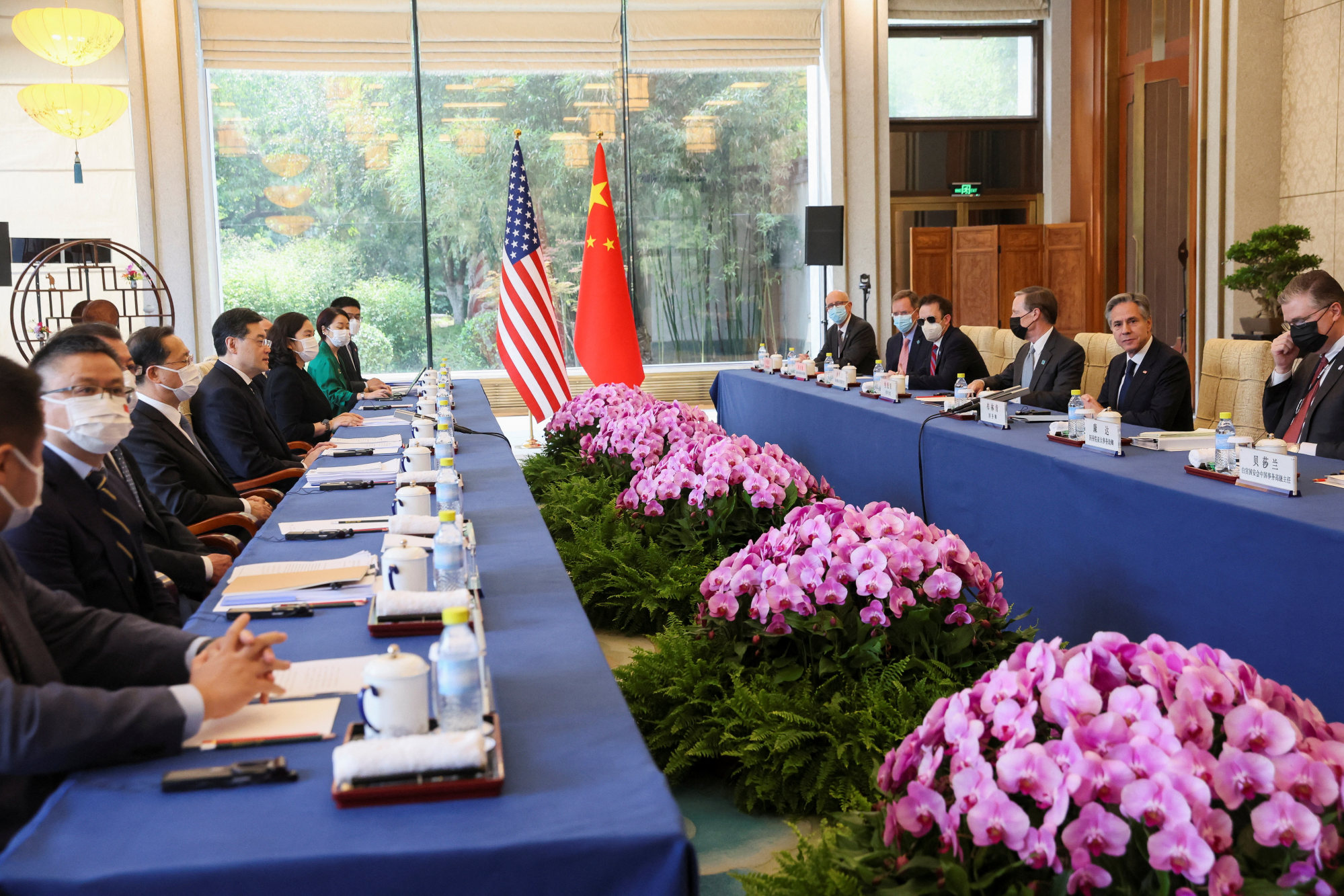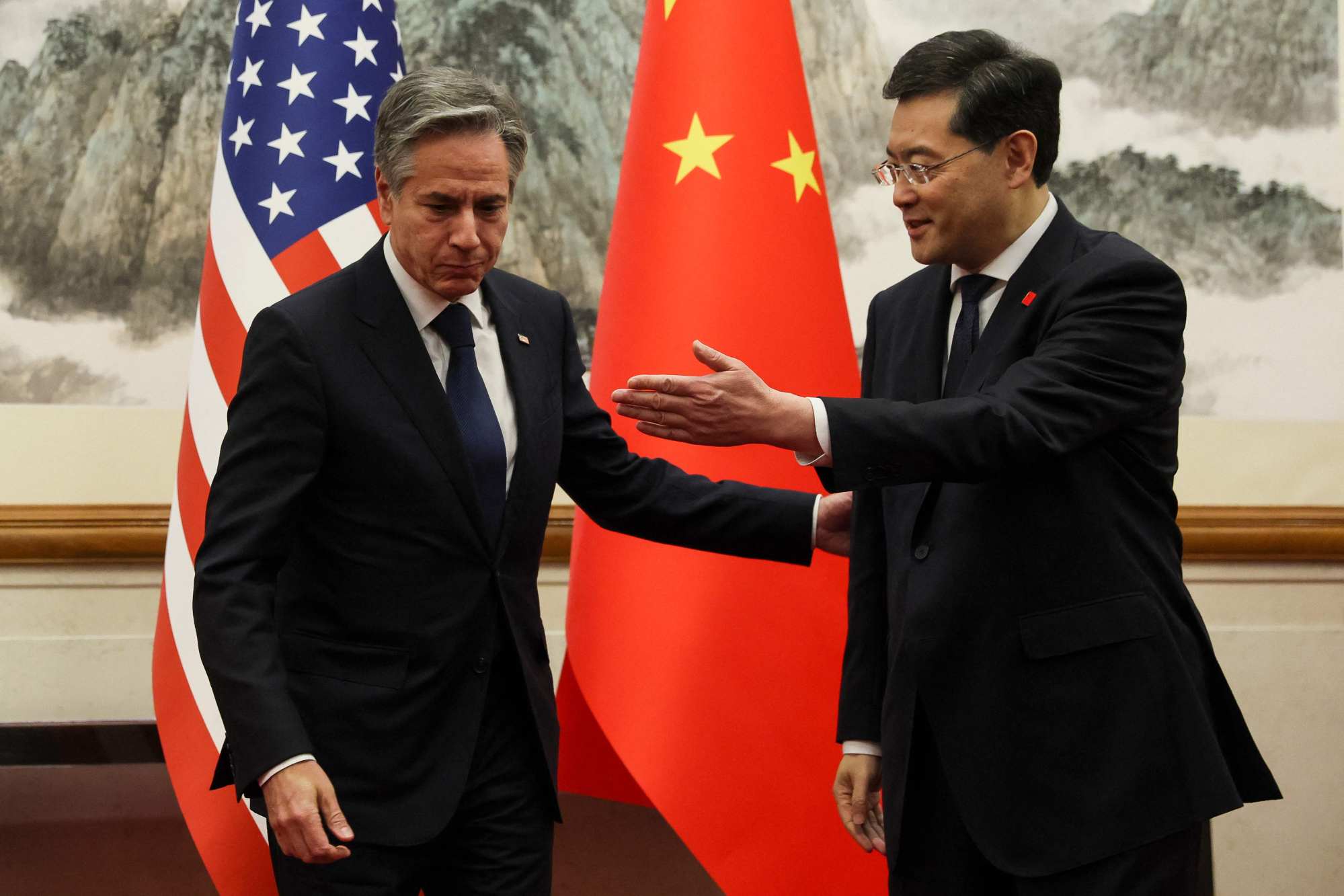
Antony Blinken and Qin Gang call meeting in Beijing ‘constructive’ and agree to continue talking
- US State Department called talks ‘candid, substantive, and constructive’
- Beijing mixed calls to continue high-level exchanges and expand cultural, business and educational exchanges with a warning about Taiwan
The talks at the Diaoyutai State Guest House lasted 5½ hours, and were described by the US State Department as “candid, substantive, and constructive”. Chinese state broadcaster CCTV called them “candid, in-depth and constructive communication on the overall relationship”.
“The secretary emphasised the importance of diplomacy and maintaining open channels of communication across the full range of issues to reduce the risk of misperception and miscalculation,” State Department spokesman Matthew Miller said in a readout.
After Blinken invited his counterpart to Washington, “they agreed to schedule a reciprocal visit at a mutually suitable time”, Miller added.
The Chinese side mixed calls to continue high-level exchanges and expand cultural, business and educational exchanges with a warning about Taiwan, one of the sorest points of contention between the two sides.
“Qin Gang pointed out that the Taiwan issue is the core of China’s core interests, the most important issue in Sino-US relations, and the most prominent risk,” CCTV said.
CCTV added that Qin emphasised the need to “discuss the increase of passenger flights between China and the United States, welcome more students, scholars, and businesspeople to visit each other’s countries, and provide support and convenience for this purpose”.
Blinken will meet Wang Yi, Chinese President Xi Jinping’s diplomacy adviser, on Monday and possibly Xi, US media reported.
Without confirming the reports, the State Department readout said the Biden administration’s top diplomat would continue meeting Chinese officials in Beijing on June 19.

Qin was flanked by executive vice-minister of foreign affairs Ma Zhaoxu and assistant foreign affairs minister Hua Chunying during the meeting. Assistant secretary of state for East Asian and Pacific sffairs Daniel Kritenbrink and US ambassador to China Nicholas Burns sat beside Blinken, according to footage of the meeting.
“Hope this meeting can help steer China-US relations back to what the two presidents agreed upon in Bali,” Hua tweeted.
The two parties then moved on to have a working dinner, sources said.
Blinken was greeted at the airport by Burns and Yang Tao, head of North American and Oceanian affairs at the Chinese foreign ministry.
US-China relations: Secretary of State Antony Blinken’s visit confirmed
Before leaving for Beijing on Saturday, Blinken said one of his goals was to set up “open and empowered communications” with Chinese officials.
He would also speak “directly and candidly about [the US’] very real concerns on a range of issues”.
“Intense competition requires sustained diplomacy to ensure that competition does not veer into confrontation or conflict,” Blinken said.
Analysts said the visit signalled a desire by both sides to re-engage, but the prospects of a breakthrough were low.
“He is expected to establish a road map and timetable with the Chinese side on senior bilateral exchanges during the trip,” Shanghai-based news site The Paper quoted Wu Xinbo, head of US studies at Fudan University, as saying.
Wu also expected the discussions would cover flights between the two countries, which have yet to return to normal, creating a hurdle for in-person exchanges. Military contacts would gradually resume, he said.
Qin Feng, an academic committee member of Peking University’s Institute for Global Cooperation and Understanding, said Blinken’s visit was part of preparation for Xi’s trip to the United States in November, where he is expected to meet US President Joe Biden on the sidelines of the Apec summit.

She said Qin and Wang Yi were likely to visit the US to nail down the details for the Chinese president’s expected trip.
Biden said on Saturday that he was hoping to meet Xi in the coming months.
“I’m hoping that, over the next several months, I’ll be meeting with Xi again and talking about legitimate differences we have, but also how there’s areas we can get along.”
‘Relatively restrained’: why Blinken’s China trip is sparking cautious hope
It is also widely expected that US Treasury Secretary Janet Yellen and Commerce Secretary Gina Raimondo will visit China after Blinken.
China has tightened the national security scrutiny in recent months, launching investigations into several US consultancy firms and banning the sales of the US chip company Micron to Chinese clients. At the same time, the United States has put more Chinese companies on its export control list.
In his phone call with Blinken, Qin also urged the US to respect China’s sovereignty, security and development interests.

Beijing regards the self-ruled island as a renegade province, to be brought under mainland control, by force if necessary. The US, like most countries, does not recognise Taiwan as an independent state, but opposes any attack on the island.
Regular talks between the world’s two largest economies were largely frozen for months, but recent high-level engagements have indicated a thaw.
US and Chinese diplomats hold ‘candid, constructive, fruitful discussions’
Over two days in May in Vienna, US national security adviser Jake Sullivan and Wang Yi held what both sides described as “candid, substantive and constructive discussions” on Taiwan and Russia’s war in Ukraine.
Also last month, Chinese Commerce Minister Wang Wentao held talks with Gina Raimondo.
And earlier in June, two senior US officials – Kritenbrink and Sarah Beran, senior director for China and Taiwan affairs at the National Security Council – visited Beijing for “candid, constructive, fruitful discussions”.
US State Department spokesman Matthew Miller said on Wednesday that Blinken would seek to establish communication channels with China and would “stand up and speak out for our values and our interests”.
In a separate briefing, Kritenbrink said Blinken’s visit would build on other recent engagements between American and Chinese officials and include “candid, direct and constructive discussions”.
“We’re not going to Beijing with the intent of having some sort of breakthrough or transformation in the way that we deal with one another,” Kritenbrink said.
“We’re coming to Beijing with a realistic, confident approach and a sincere desire to manage our competition in the most responsible way possible.”
Senior EU officials have repeatedly said they are looking to “de-risk but not decouple” with China. The Biden administration has recently adopted similar language, only to get the cold shoulder from Beijing.



